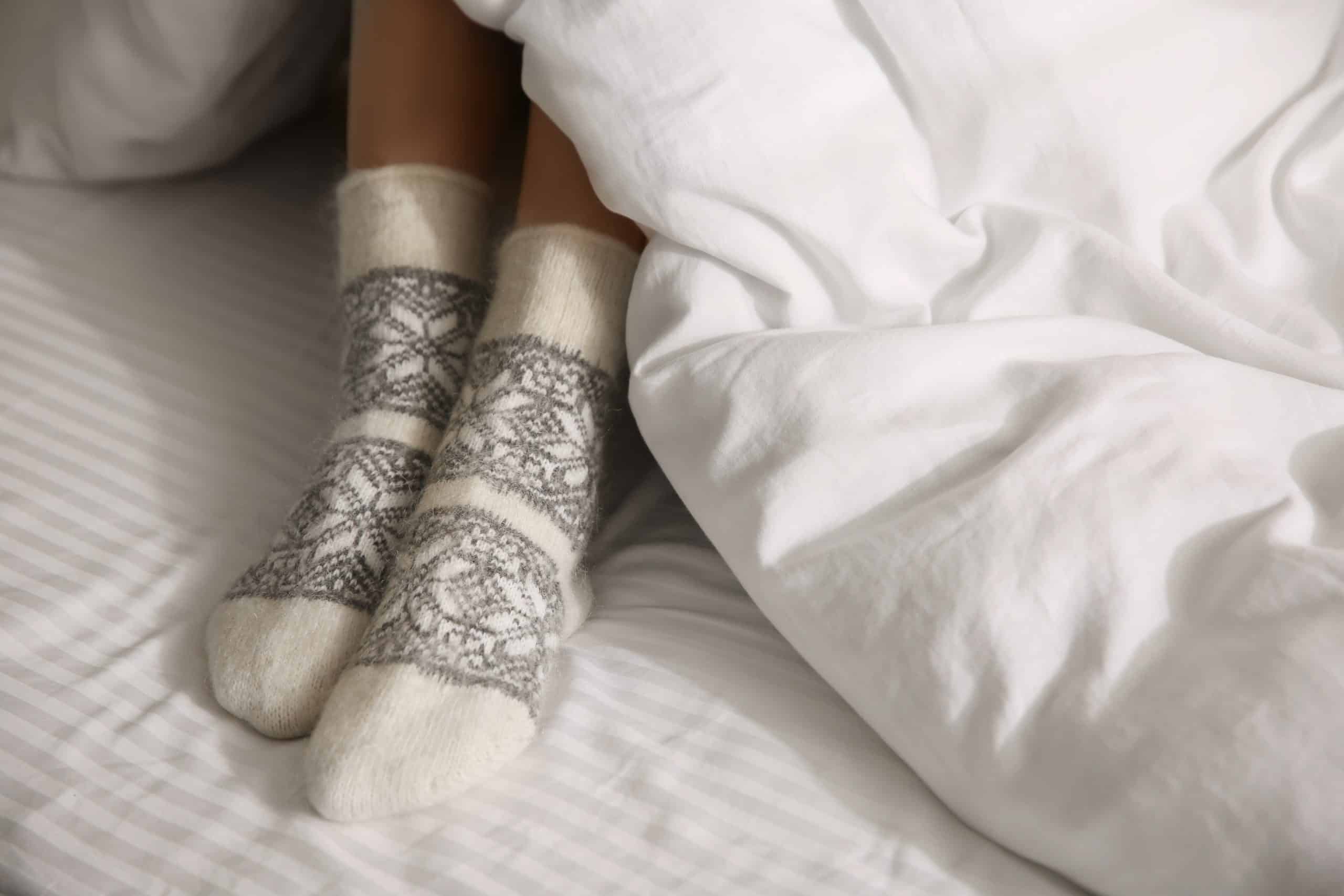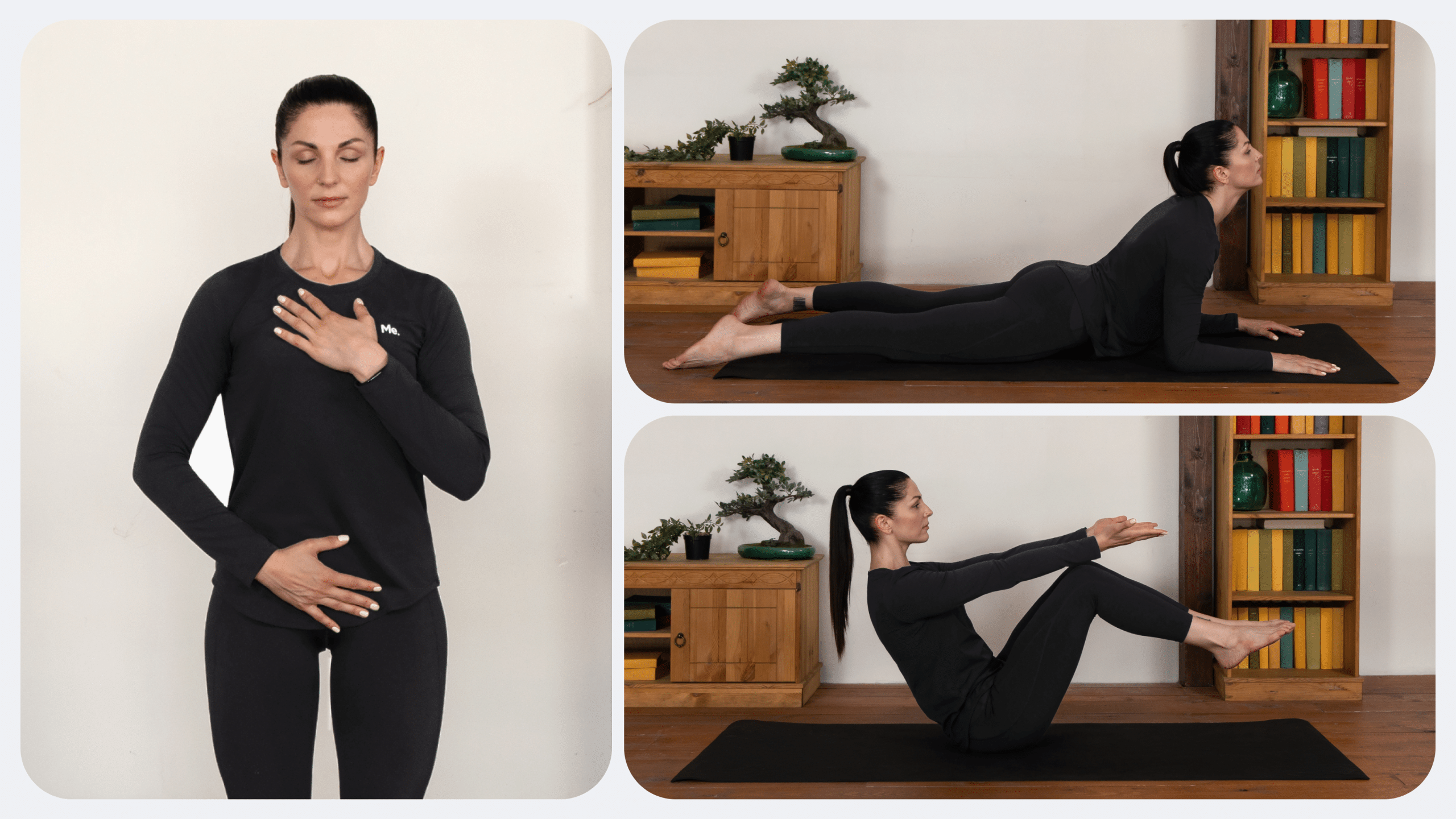According to the Centers for Disease Control and Prevention (CDC), children need at least 10 hours of sleep including naps, while adults need 7 or more hours of sleep per day (3). Not meeting these minimums can have serious consequences: drowsy driving, irritability, impaired memory, and even depression. Furthermore, poor quality and quantity of sleep are linked to various chronic health conditions, such as obesity, diabetes, high blood pressure, heart disease, and stroke (14). Despite the obvious importance of sleep, many people have difficulty getting enough. There are many reasons for diminishing sleep quality and quantity, such as working long hours, having young children, caring for aging parents, stress, anxiety, and discomfort. And while medical interventions, such as sleep medication, can help some people get the rest they need, these come with their own set of risks and side effects (11). Weighted blanket has become a popular solution for those seeking an alternative to medication for insomnia and other sleep issues. Here’s everything you need to know about weighted blankets, including the pros and cons.
What Is A Weighted Blanket?
A weighted blanket is a type of blanket that is typically filled with materials such as plastic pellets or glass beads. The added weight of these materials helps to provide a sense of security and comfort for people who use them.
Weighted blankets are often used as a treatment for conditions such as anxiety, autism, and insomnia (13).
The science behind weighted blankets is still being studied, but they are known to mimic a therapeutic technique called deep-pressure touch stimulation (7).
Weighted blankets provide gentle, evenly distributed pressure throughout the body. This pressure helps to relax the nervous system and can lead to a feeling of being hugged or held.
The deep-pressure touch stimulation from weighted blankets has been shown to increase levels of serotonin in the brain, which is known to promote calmness and relaxation (17).
Read More: Aquatic Therapy Exercises: Why And How To Do Them
Pros And Cons Of Weighted Blankets
Weigh the pros and cons of weighted blankets before deciding whether or not they’re right for you.
Pros Of Weighted Blankets
Researchers have studied the effectiveness of weighted blankets for a variety of conditions, and the results are promising. The following are some of the potential benefits of using a weighted blanket:
May Reduce Symptoms Of Anxiety
Autonomic arousal in people with anxiety disorders is the activation of the sympathetic nervous system in response to perceived threats. This arousal manifests as physical symptoms such as a racing heart, sweating, and difficulty breathing (1).
Deep pressure stimulation (the type of pressure provided by weighted blankets) has been shown to help reduce autonomic arousal and the physical symptoms of anxiety (2).
May Improve Sleep Quality For Autistic Children
One of the characteristics of autism spectrum disorder (ASD) is difficulty sleeping. This may be due to sensory processing issues, anxiety, or other factors (15).
Weighted blankets have been shown to help reduce sleep problems in children with ASD by providing deep-pressure touch stimulation that can lead to a feeling of being hugged or held (16).
May Decrease Insomnia Symptoms
Insomnia is a sleep disorder that is characterized by difficulty falling asleep or staying asleep. It can be caused by stress, anxiety, medications, and other factors. Other sleep disorders, such as restless leg syndrome, can also cause insomnia (10).
Weighted blankets have been shown to help people with insomnia sleep better by calming the nervous system, reducing anxiety, and relaxing the body (13) (16).
May Reduce Hyperactivity In People With Attention Deficit Hyperactivity Disorder (ADHD)
Attention deficit hyperactivity disorder (ADHD) is a condition that is characterized by problems with focus, hyperactivity, and impulsivity. ADHD can make it difficult to concentrate, sit still, or control impulsive behavior (4).
Some research shows that weighted vests may help reduce symptoms of ADHD by providing deep-pressure touch stimulation that can lead to a feeling of being hugged or held (2).
Participants in one study who wore weighted vests showed improved attention and behavior compared to those who did not wear weighted vests (8).
May Alleviate Chronic Pain
Chronic pain is pain that lasts for more than three months. It can be caused by conditions such as arthritis, fibromyalgia, endometriosis, and nerve damage (5).
Weighted blankets have been shown to help reduce chronic pain by providing deep-pressure touch stimulation that is calming.
A 2021 study found that people who used weighted blankets for a week had reduced perceptions of pain and improved sleep compared to those who did not use weighted blankets (18).
May Calm Symptoms Of Anxiety During Medical Procedures
Medical procedures tend to be anxiety-provoking, especially for children and individuals with mental issues.
Weighted blankets have been shown to help decrease anxiety during medical procedures by providing deep-pressure touch stimulation that can lead to a feeling of being hugged or held (12) (17).
A study on adolescents undergoing molar extraction (a type of dental surgery) found that those who used weighted blankets had lower anxiety levels during the procedure than those who did not use weighted blankets (6).
BetterMe app is a foolproof way to go from zero to a weight loss hero in a safe and sustainable way! What are you waiting for? Start transforming your body now!
Cons Of Weighted Blankets
Weighted blankets are generally safe, but there are a few potential risks to be aware of:
Risk Of Suffocation
Weighted blankets should never be used by infants or young children because of the risk of suffocation. If you’re considering using a weighted blanket for a child, be sure to talk to their pediatrician first.
Risk Of Overheating
Weighted blankets are typically made with materials that can trap heat, such as plastic pellets or glass beads. This may make them too warm for some people, especially in hot weather or if the person has a fever.
If you’re considering using a weighted blanket, be sure to choose one that is made with breathable materials such as cotton or wool.
Risk For People With Asthma And Sleep Apnea
People with asthma or sleep apnea may be at risk for suffocation if they use a weighted blanket. If you have asthma or sleep apnea, talk to your doctor before using a weighted blanket.
Risk For People With Sensory Processing Issues
Weighted blankets may be too stimulating for some people with sensory processing issues. If you have a sensory processing disorder, talk to your occupational therapist before using a weighted blanket.
Risk For People With Claustrophobia
Weighted blankets may trigger feelings of claustrophobia in some people. You may want to consider how the weight of the blanket feels before using it. If you have claustrophobia, try using the weighted blankets for short periods at first to see how you feel.
Costly
Compared to regular blankets, weighted blankets can be quite expensive. They typically range in price from $100 to $300. If you’re considering using a weighted blanket, be sure to factor in the cost before making your purchase.
Read More: Compression Therapy: How It Works & Benefits
Tips For Buying And Using Weighted Blankets
If you’re considering using a weighted blanket, there are a few things to keep in mind:
Choose The Correct Weight
As a general rule, a weighted blanket should be about 5-10% of your body weight (9). So, if you weigh 150 pounds, you would need a 15-pound weighted blanket.
Most adults can use a weighted blanket that is between 12 and 30 pounds. Most children can use a weighted blanket that is between 3 and 12 pounds.
Choose The Right Material
Weighted blankets are typically made with materials such as plastic pellets or glass beads. Pellets are notorious for being noisy, so if you’re a light sleeper, you may want to choose a weighted blanket that is filled with glass beads.
Consider whether the material will be too hot for you before making your purchase.
Wash The Blanket Regularly
Weighted blankets should be washed regularly to keep them clean and free of dust mites. Most weighted blankets can be machine-washed, but some require dry cleaning.
Be sure to read the care instructions that come with your blanket before washing it. A blanket with a removable cover is easier to wash than a blanket without a cover.
Use The Blanket Sparingly At First
If you’re new to using a weighted blanket, start by using it for short periods at first. See how you feel after using the blanket for 30 minutes to an hour. If you’re feeling anxious or claustrophobic, take the blanket off and try again another day.
Intense sweat sessions, working weight loss tips, lip-smacking recipes come in one package with the BetterMe app. And all of it is at your fingertips, start transforming your life now!
Use The Blanket Under Supervision
Weighted blankets should never be used by infants or young children because of the risk of suffocation. If you’re considering using a weighted blanket for a child, be sure to talk to their pediatrician first.
Always use the blanket under supervision and stop using it if you feel claustrophobic or uncomfortable.
Consider Your Climate
If you live in a hot climate or if you have a fever, you may want to avoid using a weighted blanket. Weighted blankets are typically made with materials that can trap heat, which may make them too warm for some people.
Talk To Your Doctor
If you have any medical conditions, such as asthma, sleep apnea, or claustrophobia, be sure to talk to your doctor before using a weighted blanket.
The Bottom Line
Weighted blankets are a safe and effective way to reduce anxiety, improve sleep quality, and decrease symptoms of ADHD. However, there are a few potential risks to be aware of. If you’re considering using a weighted blanket, talk to your doctor or occupational therapist first.
DISCLAIMER:
This article is intended for general informational purposes only and does not serve to address individual circumstances. It is not a substitute for professional advice or help and should not be relied on for making any kind of decision-making. Any action taken as a direct or indirect result of the information in this article is entirely at your own risk and is your sole responsibility.
BetterMe, its content staff, and its medical advisors accept no responsibility for inaccuracies, errors, misstatements, inconsistencies, or omissions and specifically disclaim any liability, loss or risk, personal, professional or otherwise, which may be incurred as a consequence, directly or indirectly, of the use and/or application of any content.
You should always seek the advice of your physician or other qualified health provider with any questions you may have regarding a medical condition or your specific situation. Never disregard professional medical advice or delay seeking it because of BetterMe content. If you suspect or think you may have a medical emergency, call your doctor.
SOURCES:
- Anxiety (2022, ncbi.nlm.nih.gov)
- A randomized controlled study of weighted chain blankets for insomnia in psychiatric disorders (2020, jcsm.aasm.org)
- Are You Getting Enough Sleep? (2022, cdc.gov)
- Attention Deficit Hyperactivity Disorder (2022, ncbi.nlm.nih.gov)
- Chronic Pain (2022, ncbi.nlm.nih.gov)
- Effect of deep pressure input on parasympathetic system in patients with wisdom tooth surgery (2016, sciencedirect.com)
- Effects of deep pressure stimulation on physiological arousal (2015, /pubmed.ncbi.nlm.nih.gov)
- Effects of Weighted Vests on Attention, Impulse Control, and On-Task Behavior in Children With Attention Deficit Hyperactivity Disorder (2014, research.aota.org)
- How Heavy Should a Weighted Blanket Be? (2022, sleepfoundation.org)
- Insomnia: Definition, Prevalence, Etiology, and Consequences (2007, ncbi.nlm.nih.gov)
- People with insomnia: experiences with sedative hypnotics and risk perception (2015, onlinelibrary.wiley.com)
- Physiological Effects of Deep Touch Pressure on Anxiety Alleviation: The Weighted Blanket Approach (2013, semanticscholar.org)
- Positive effects of a weighted blanket on insomnia (2015, academia.edu)
- Sleep Duration and Quality: Impact on Lifestyle Behaviors and Cardiometabolic Health: A Scientific Statement From the American Heart Association (2016, ahajournals.org)
- Sleep Problems in Autism Spectrum Disorder: A Literature Review (2013, link.springer.com)
- The Immediate Effects of Deep Pressure on Young People with Autism and Severe Intellectual Difficulties: Demonstrating Individual Differences (2017, hindawi.com)
- Using weighted blankets in an inpatient mental health hospital to decrease anxiety (2021, sciencedirect.com)
- Widespread Pressure Delivered by a Weighted Blanket Reduces Chronic Pain: A Randomized Controlled Trial (2022, pubmed.ncbi.nlm.nih.gov)


















